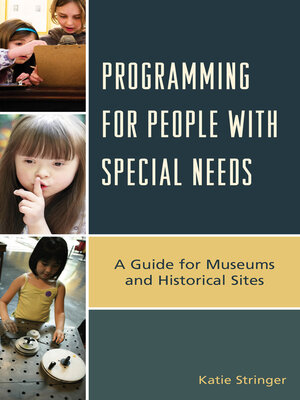Programming for People with Special Needs
ebook ∣ A Guide for Museums and Historic Sites · American Association for State and Local History
By Katie Stringer

Sign up to save your library
With an OverDrive account, you can save your favorite libraries for at-a-glance information about availability. Find out more about OverDrive accounts.
Find this title in Libby, the library reading app by OverDrive.



Search for a digital library with this title
Title found at these libraries:
| Library Name | Distance |
|---|---|
| Loading... |
Programming for People with Special Needs: A Guide for Museums and Historic Sites will help museums and historic sites become truly inclusive educational experiences. The book is unique because it covers education and inclusion for those with both intellectual and learning disabilities.
The book features the seven key components of creating effective programming for people with special needs, especially elementary and secondary students with intellectual disabilities:
Sensitivity and awareness trainingPlanning and communicationTimingEngagement and social/life skillsObject-centered and inquiry-based programsStructureFlexibility
In addition, this book features and discusses programs such as the Museum of Modern Art's Meet Me program and ones for children with autism at the Transit Museum in Brooklyn as models for other organizations to adapt for their use.
Its focus on visitors of all ages who have cognitive or intellectual disabilities or special needs makes this title essential for all museum and historic site professionals, especially educators or administrators, but also for museum studies students and those interested in informal education.
The book features the seven key components of creating effective programming for people with special needs, especially elementary and secondary students with intellectual disabilities:
Sensitivity and awareness trainingPlanning and communicationTimingEngagement and social/life skillsObject-centered and inquiry-based programsStructureFlexibility
In addition, this book features and discusses programs such as the Museum of Modern Art's Meet Me program and ones for children with autism at the Transit Museum in Brooklyn as models for other organizations to adapt for their use.
Its focus on visitors of all ages who have cognitive or intellectual disabilities or special needs makes this title essential for all museum and historic site professionals, especially educators or administrators, but also for museum studies students and those interested in informal education.







